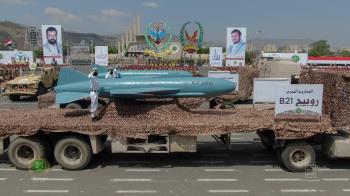Alwaght- Late September 2015, at the time of the Muslim religious festival Eid al-Adha and Yom Kippur, the holiest day of the year of the Jewry, the Israeli Minister of Agriculture and Rural Development Uri Ariel, accompanied by dozens of Israeli settlers, intruded Al-Aqsa Mosque, however, he faced the resistance of the worshipers in the place who wanted to prevent desecration of the holy site by the Israelis.
In reaction, the Israeli troops attacked the Palestinian worshipers using rubber bullets and tear gas, injuring some of the Palestinians.
A couple of days later on October 1, 2015, Muhannad Halabi, 19, a Palestinian student, was shot dead by the Israeli forces after conducting a suicide attack, killing two Israelis. The incident represented an onset for the Al-Quds intifada which has been rolling on for seven months so far in the West Bank and the occupied Al-Quds.
The analysts suggest that the factors driving the Palestinian uprising are not limited to the mentioned events.
The intifada has left deep impacts on the Israeli regime only four months after its eruption.
However, due to a couple of reasons, the Palestinian intifada holds no clear prospects.
Intifada’s effects on the Israeli regime
What are the security, political and economic repercussions of the Palestinian revolt on Tel Aviv?
The Al-Quds uprising has left a considerable amount of influence on Tel Aviv in a set of fields, causing the Israeli officials to grow deep concerns over security, economic and political matters at home.
In a general view, the intifada’s effects on Tel Aviv are as follows:
Political impacts
The political circles inside the Israeli regime thought the revolt would soon wind down because of improper conditions inside the Palestinian community and also in the Arab world. But now everybody in the Israeli regime is surprised to see the sustainment of the popular intifada. Its relative intensification has stirred bewilderment, anxiety and gaps between the Israeli political forces. Now divided by the influences of the intifada, some of the Israeli parties call for the peace process with the Palestinians to be restored while others still back tough responses to the Palestinians and conducting targeted assassinations.
All in all, an ongoing Palestinian revolt in Al-Quds and the West Bank has left significant effects on the measures of the Israelis. Most important of them include:
- Cessation of spatiotemporal division of the Al-Aqsa Mosque between the Palestinians and the Israelis, and blocking access of the government ministers and Knesset members to the holy site in a bid to calm the situation.
- Discrediting the strategy of the Israeli right-wing parties for management of the conflict without presenting any solution. The pressure also mounted on the Prime Minister Netanyahu to re-activate the political process and dialogue with the Palestinian Authority.
- Confusion of the plans of Netanyahu’s right-wing government and appearance of considerable differences inside the cabinet on how to deal with the Palestinian side.
- Increased disaccords of political authorities with the intelligence services on the way of reaction to the Palestinians. They accuse each other of failure to end the intifada.
- Considering an array of ways to pacify the uprising. The Israeli government offered facilitation of completion of unconcluded infrastructure projects in the regions under Palestinian Authority's governing.
Security Impacts
Despite the fact that the intifada has lost its preliminary energy, it still represents a crucial concern to the Israeli regime’s security services. The Israeli security officials, including the Defense Minister Moshe Ya’alon and the Chief of General Staff of the Israel Defense Forces Gadi Eizenkot still demand limited responses to the uprising at the fears of provocation of a larger part of the Palestinian community.
On the other side, despite the fact that there is a large-scale intelligence and security cooperation between the Israelis and the Palestinian Authority, there is no way to contain the revolt because it is run by individual activities against the Israelis and does not much rely for its energy on the Palestinian political groups. To put it another way, the Palestinian Authority is far from being able to block resistant networks and foil massive public activities of the Palestinian people.
Accordingly, it could be claimed that the overarching security influences of the intifada on Tel Aviv are as follows:
- The Israeli military commanders are worried that the intifada could take an erosive course. Also, due to the uprising, Gadi Eizenkot’s long-term plans have been halted.
- Admitting the revolt as an intifada by the Israeli security services and consequently imposing further costs on Tel Aviv.
- Mobilization of popular and reserve forces which brings forth funding problems for Tel Aviv.
- 77 percent of the Israelis now insist that they no longer feel secure- a figure laying bare the fact that now individual security feeling has dropped to the lowest levels in the occupied territories.
- The Israeli officials started to grow worries over possible collapse of the Palestinian Authority and thus end of security collaboration as a successful means of Tel Aviv to provide its security.
- Tel Aviv is also concerned that 88 and 53 percent of the Palestinians support consecutively armed attacks and armed conflict to terminate the occupation of their lands.
Economic impacts
One of the parts that received the biggest effects from the Palestinians’ intifada is the Israeli economy which consists of tourism, investment, stock market and even the public service places like the restaurants. According to the figures published by Israeli sources, only after two months of the violence in the occupied territories the Israeli regime's economy received a $1.3 billion loss, mostly associated with tourism. The same loss is observable in security costs, and now the Israeli government has to deal with the military costs which now touch $1billion. Furthermore, reduced interests of Palestinians in the Israeli products and lost feeling of security of the Israeli settlers and thus their stay at home are other negative impacts of the intifada on the Israeli economy.



























